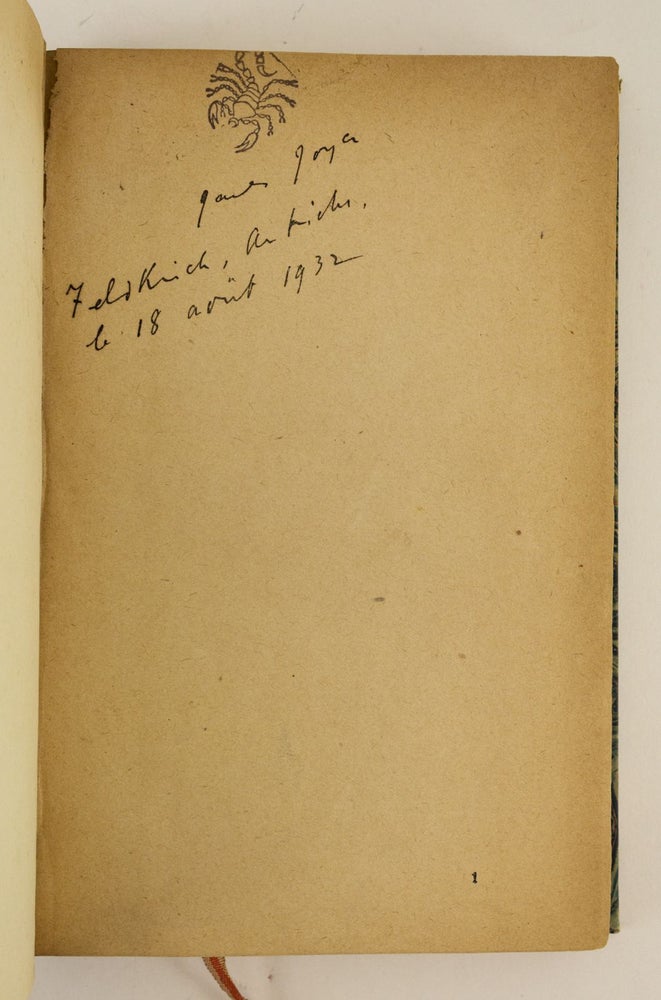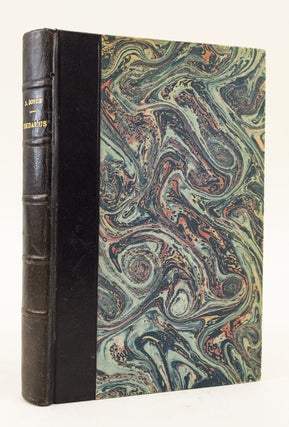DEDALUS. PORTRAIT DE L'ARTISTE JEUNE PAR LUI-MÊME.
(Paris: Éditions de la Sirène, 1924). 220 x 140 mm. (8 5/8 x 5 1/2"). 274 pp., [3] leaves (last blank).Translated by Ludmila Savitzky. FIRST EDITION IN FRENCH.
20th century blue roan-backed marbled boards, raised bands, gilt titling, marbled endpapers (neat old repair to head of spine). Original printed paper wrappers bound in. Front flyleaf SIGNED BY JOYCE and dated "Feldkirch, Austria, 18 August 1932"; title page with ink signature of French collector Georges Pernoud (1914-1976), editor-in-chief of "Paris Match"; front flyleaf and half title with his ink scorpion stamp. Slocum & Cahoon D-15. ◆Spine slightly sunned, one corner lightly rubbed, short crack to head of front hinge (no looseness), front flyleaf with three-inch tear along gutter, leaves somewhat browned as in all copies due to paper quality, but still a respectable copy, clean and solid, with no fatal defects.
This first French version of Joyce's first novel played a critical role in his future career—establishing his name among the Paris intelligentsia and leading to his introduction to Sylvia Beach, the bookseller who would print his masterpiece, "Ulysses"; of great importance, our copy was inscribed by him when he was visiting one of his most consequential champions in a place that also had a special significance for him. In Joyce's "Portrait, " a coming-of-age story first printed in 1916, we encounter Stephen Dedalus, one of the century's great characters, later to play a starring role in "Ulysses." Day calls Joyce's autobiographical narrative "the definitive presentation of the 20th century artist in rebellion, breaking from his matrix and becoming himself. . . . The artist is presented as the supreme hero, and he is the outsider." This French translation is the work of Russian-born Ludmila Bloch-Savitsky (1881-1957), a literary critic and agent who was well-connected in Parisian publishing circles, in addition to being an experienced French and Russian translator. Ezra Pound prevailed on her to accept this difficult work from an unknown Irish writer, and she undertook the daunting assignment of conveying Joyce's unique style in a new language. It took her nearly five years to accomplish this feat, with Joyce complaining constantly about the slow process, but the final product had the effect its author had dreamed of--making him a feted artiste among the Paris literary set and leading to his first meeting with Sylvia Beach, who was to play such a pivotal role in his life. Our copy was signed by Joyce during his sojourn in Austria, where he was visiting his friend Eugène Jolas (1894-1952), co-founder and editor of the Surrealist literary journal "transition," the first 15 issues of which featured excerpts of Joyce's "Work in Progress," eventually published in book form as "Finnegans Wake." One of Jolas' key motives in establishing "transition" was to bring about "a revolution in the English language," as set forth in his "Manifesto of the Word," which makes such iconoclastic declarations as: "Narrative is not mere anecdote, but the projection of a metamorphosis of reality"; "The literary creator has the right to disintegrate the primal matter of words imposed on him by text-books and dictionaries"; and "He has the right to use words of his own fashioning and to disregard existing grammatical and syntactical laws." Joyce's works were an ideal example of these principles, and as a critic, Jolas was a fervent and influential advocate for the Irish writer. Like Jolas, the town of Feldkirch played a decisive role in Joyce's career: during World War I, the Joyce family was forced to flee their residence in Trieste to avoid being arrested as enemy aliens. On their journey through Austria to the safety of neutral Switzerland, their train was boarded by German officials in Feldkirch, and Joyce narrowly escaped detention. In 1932 when Joyce visited Jolas (who was vacationing in Feldkirch), he remarked to his friend, "Over there, on those [railroad] tracks, the fate of 'Ulysses' was decided in 1915." This quote is now prominently displayed (in German) in a plaque in Feldkirch railway station. It is without doubt that Joyce inscribed our volume during that visit, though it was perhaps for an admirer and not for Jolas, who would surely have warranted a warm acknowledgement to accompany the signature. (ST15985)
Price: $9,500.00


